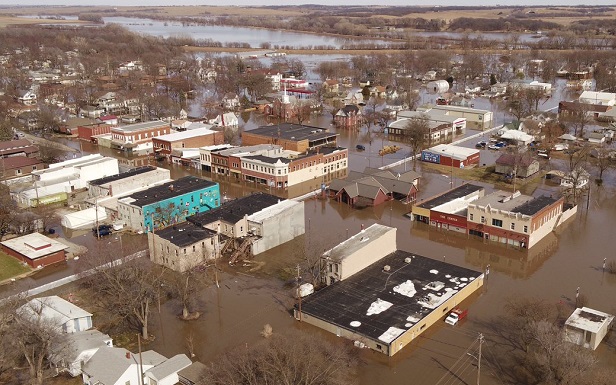The silence in my neighborhood, a block away from the main line of the Burlington Northern & Santa Fe, has been almost eerie at times during the last few days. The trains, which ordinarily pass with considerable fanfare several times an hour, have been missing --- the major sign here on high ground in south central Iowa of massive flooding in the Missouri River valley along Iowa's western shore.
That silence is likely to continue for some time --- until the waters recede, the roadbed is stabilized and tracks repaired. And it will be months --- years --- before damage to the infrastructure and economy of that part of the state recovers. And then there's Nebraska, to the west, where the damage due to snow-melt- and ice-melt-related flooding was worse.
It's estimated, for example, that billions of dollars will be required to repair the Missouri valley levee system that is intended to protect those who live and farm there from disasters like this. As of now, small towns --- Pacific Junction and others --- are under water, considerably larger cities have been heavily damaged and huge expanses of farmland are flooded. Fortunately, few lives have been lost.
The drone-generated photo here is of Hamburg, a pretty little town of some 1,200 souls in extreme southwest Iowa's Fremont County. There's an odd story here. Hamburg residents are accustomed to floods in the lower part of town and after a scare a few years ago hurriedly raised a levee that protected the village. But the construction did not meet Army Corps of Engineers standards, there was not enough money available it was decided to meet those standards and so the levee was returned to its earlier height. There's speculation now, of course, that those extra feet of earthwork might have protected the town this time had they been left in place.
There are other oddities. This area of Iowa is among the state's most solid "red zones" where a majority automatically vote Republican and many grumble about too much government "welfare" --- until, of course, the grumblers are themselves in need, as they are now.
And these are among the folks least likely to acknowledge climate change and/or the role of human folly in bringing it about, including the resulting weather extremes --- like those they now are experiencing.
+++
Another minor point I noticed while trying to stay abreast of developments in eastern Nebraska and southwest Iowa over the weekend: I'm still living in the past, looking toward my digital subscription to The Des Moines Register (once upon a time "the newspaper Iowa depends upon") to keep me informed.
That's basically because let's say 20 years ago, when The Register was adequately staffed, reporters and photographers would have been dispatched to western Iowa at the first sign of trouble to cover the developing situation.
There was none of that over the weekend, however, so I turned to the Omaha World-Herald, The Council Bluffs Nonpareil and other regional media for information --- grateful that our technological connectedness makes that possible.
+++
I've also been wondering how many Iowans have noticed that as waters were rising to our immediate west, Cyclone Idai was taking a terrible toll in coastal Mozambique, spreading inland to Malawi and Zimbabwe. Or how many of us actually know where those countries are.
In such times, I'm always reminded of an editor-in-chief of mine many years ago who, during a news meeting when some of us were arguing that the loss of thousands of lives to storms and related flooding in Bangladesh should be noted in a regional Iowa daily. "Iowans aren't interested in brown or black bodies," he said. And that's probably still the truth.
In fact, it seems some days as if the more connected we become the more disconnected we are.


No comments:
Post a Comment